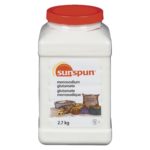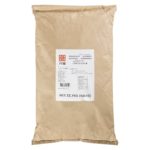The Pros and Cons of MSG Use in Food
What is MSG?
Known widely as MSG, monosodium glutamate is the sodium salt derived from glutamic acid, an amino acid that is naturally occurring and necessary for the creation of proteins. About 10 to 25% of all food protein – from both animal and plant sources – is comprised of glutamic acid.
MSG is a popular food additive and helps to enhance savoury flavours in foods. While it is a common additive, it also occurs naturally in some foods such as tomatoes and cheese.
But what other foods often contain MSG?
Foods that Commonly Contain MSG
While the use of MSG in processed foods is not widely advertised, it is widely used. Producers of processed foods are required to list MSG as an ingredient, along with all others, by its proper name of monosodium glutamate.
Where can you find MSG in food? While there are many that can be added to this list, here are three common places to search for Monosodium Glutamate on your ingredient labels:
Take Out Food
Many of us know that MSG is commonly associated with Asian foods. While there has been a movement by many Chinese food establishments to remove MSG as an ingredient, others continue to use it. Other well-known fast-food brands, such as Kentucky Fried Chicken, use it in several of their menu items.
Snack Foods and Potato Chips
Some brands that manufacture chips and other snack foods look to MSG to help them boost the savoury flavours of their products. Two consumer favourites include Doritos and Pringles.
Seasonings, Spice Mixes, and Soups
To help enhance the flavour in seasonings, spice mixes, and soups, manufacturers will add MSG. This includes bouillon cubes and cups, dried soup mixes, and canned soups. Many instant noodle products, such as Mr. Noodles, also include MSG in their spice packets to increase the savoury flavour of their soups.
The Pros & Cons
There are a myriad of articles that have been published on the many benefits and drawbacks of the use of monosodium glutamate in food, and the topic has been hotly debated for many years. Not to worry though – we’ve done the research and have summarized some of the most widely discussed topics here for you!
The Cons
The biggest, and perhaps the most well-known, reason for avoiding MSGs in food are the suspected links to negative health effects. Numerous human studies have suggested that MSG can promote weight gain, increase hunger and food intake, and poses an increased risk of chronic conditions such as heart disease and diabetes. In animal studies, MSG has been linked to obesity, liver damage, fluctuations in blood sugar, elevated risk of heart disease, behavioural problems, nerve damage, and increased inflammation. In both animal and human studies, MSG has been linked to toxic effects on the reproductive system.
Some people who may have a hypersensitivity to MSG and consume foods with it as an ingredient may experience the following adverse reactions, known as MSG symptom complex:
- Headache
- Flushing
- Sweating
- Facial pressure or tightness
- Numbness, tingling or burning in the face, neck and other areas
- Rapid, fluttering heartbeats (heart palpitations)
- Chest pain
- Nausea
- Weakness
Though no study has provided a definitive link between these symptoms and MSG intake, researchers have acknowledged that some people have experienced the above reactions for a short period of time after consuming foods with MSG in them, and the FDA has received many reports from consumers describing the same reactions.
MSG has been determined safe for consumption by both Health Canada and the Food and Drug Administration (FDA). While there are no regulations on the amount of MSG that may be used in foods, Health Canada does recommend that manufacturers of food products follow Good Manufacturing Practices (GMPs), using “only the smallest amount needed to enhance the flavour.”
The Pros
While some food manufacturers have chosen to remove MSG from their ingredient list, quite a few have stood by it and continue to use it in their food. One of the biggest reasons that brands continue to use MSG is the flavour it brings out. Widely known as a flavour enhancer, MSG heightens the umami flavour in their food products – that salty, savoury, meaty flavour that makes our mouths water! It does not, however, add any flavour of its own and does not enhance fruity or sweet flavours.
MSG enhances the flavour of salty, savoury foods and is lower in sodium than salt – it contains only a third of the amount of sodium you would find in salt. Researchers have recently found that including MSG in food may even help reduce excessive salt intake, which can contribute to cardiovascular disease. Many manufacturers of processed foods who wish to cut back on salt content but not flavour add MSG to keep consumers enjoying the products they’ve come to know and love.
Finding MSG in Your Local Wholesale Club
Want to enhance the flavour of your savoury dishes, without increasing salt content? The Wholesale Club has you covered! We sell two brands of MSG to share with you:

Sunspun Monosodium Glutamate
Available in 2.7kg, Sunspun is a popular brand among chefs – the professionals in restaurants and homemade food lovers alike!
Start Shopping Today

Six Fortune Monosodium Glutamate
For those economically efficient chefs who are looking to shop for a bigger bulk package of MSG, Six Fortune brand is here!





















